

Teachers Have to Follow Copyright Too. It’s For the Kids is Not a Justification Materials for our classroom can be expensive. I’ve oftentimes thought the price of an online tool or math activity book or …. were completely overpriced. My students would benefit but this is not a justification to take someone’s intellectual property. Houston School Sued This article shares how one school was sued over their photocopying of a resource for multiple students. What About Fair Use? Fair Use is not an unlimited license to use anything so long as it’s for the children. The rule of thumb is you can share up to 10% of a work… But not the heart of the work. No One Can Copyright These 15 Things, and They May Surprise You. What is copyright? In short, it’s a legal right for content creators. Clarifying Copyright - For Teachers. A guide for teachers With digital disruption changing the way we all access and disseminate information, recent changes to the legal framework for copyright with more to come, and the importance of academic integrity in the spotlight, teachers need to be tech-savvy and informed on the subject of copyright.
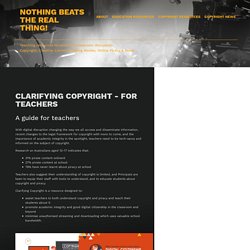
Research on Australians aged 12-17 indicates that: 31% pirate content onlinent 27% pirate content at school 76% have never learnt about piracy at school. Digital Millennium Copyright Act. The Digital Millennium Copyright Act (DMCA) is a 1998 United States copyright law that implements two 1996 treaties of the World Intellectual Property Organization (WIPO).
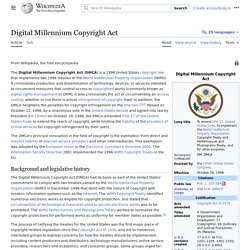
It criminalizes production and dissemination of technology, devices, or services intended to circumvent measures that control access to copyrighted works (commonly known as digital rights management or DRM). It also criminalizes the act of circumventing an access control, whether or not there is actual infringement of copyright itself. In addition, the DMCA heightens the penalties for copyright infringement on the Internet.[1][2] Passed on October 12, 1998, by a unanimous vote in the United States Senate and signed into law by President Bill Clinton on October 28, 1998, the DMCA amended Title 17 of the United States Code to extend the reach of copyright, while limiting the liability of the providers of online services for copyright infringement by their users.
Provisions[edit] Title IV: Miscellaneous Provisions[edit] 15 Surprising Things That Can’t Be Copyrighted – The Mission – Medium. What is copyright?
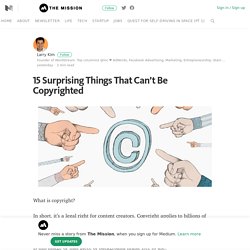
In short, it’s a legal right for content creators. Nothing beats the real thing. IP infographics copynotright. Copyright & Copyleft - Home - Welcome to Copyright and Copyleft. 5-Minute Film Festival: Teaching Digital Citizenship. "Digital citizenship" is an umbrella term that covers a whole host of important issues.
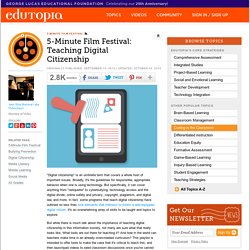
Broadly, it's the guidelines for responsible, appropriate behavior when one is using technology. But specifically, it can cover anything from "netiquette" to cyberbullying; technology access and the digital divide; online safety and privacy; copyright, plagiarism, and digital law, and more. In fact, some programs that teach digital citizenship have outlined no less than nine elements that intersect to inform a well-equipped digital citizen. Copyright & creativity for ethical digital citizens - ikeepsafe.org. The project was sponsored in part by a generous grant from the Center for Copyright Information.
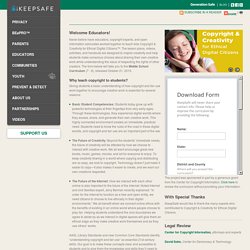
Click here to review the curriculum without providing your information. With Special Thanks. Copyrights and Wrongs (9-12) Copyright in NSW government schools. Copyrightguidesch. Copyright Basics (Global) Why Your Favorite Video Just Disappeared From YouTube. YouTube is the most popular video platform in the world, but that doesn’t make it exempt from intellectual property laws.
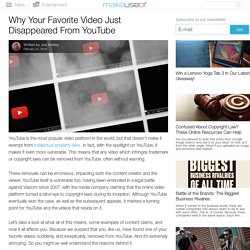
In fact, with the spotlight on YouTube, it makes it even more vulnerable. This means that any video which infringes trademark or copyright laws can be removed from YouTube, often without warning. These removals can be erroneous, impacting both the content creator and the viewer. YouTube itself is vulnerable too, having been embroiled in a legal battle against Viacom since 2007, with the media company claiming that the online video platform turned a blind eye to copyright laws during its inception. Although YouTube eventually won the case, as well as the subsequent appeals, it marked a turning point for YouTube and the videos that reside on it. Let’s take a look at what all of this means, some examples of content claims, and how it all affects you. Explaining Intellectual Property Intellectual property laws are a murky business.
How To Teach Your Students Copyright Basics. While in school, students learn a range of things that will help them with studying in a college or university and assist them throughout their future lives.
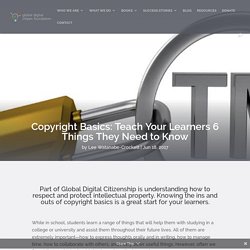
All of them are extremely important—how to express thoughts orally and in writing, how to manage time, how to collaborate with others, and many other useful things. However, often we forget that students should also know how the law works. Is copyright law in China any different from in the United States? A group of Chinese writers is accusing Google of copyright infringement after the company scanned their books as part of its massive Google Library project, China Daily reported Wednesday.
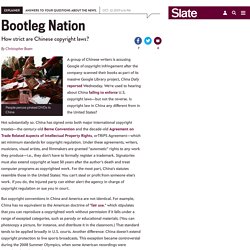
We're used to hearing about China failing to enforce U.S. copyright laws—but not the reverse. The Code of Best Practices in Fair Use for Media Literacy Education. Coordinated by: The Media Education Lab, Temple University The Program on Information Justice and Intellectual Property, American University Washington College of Law The Center for Media & Social Impact, American University With funding from: The John D. and Catherine T.
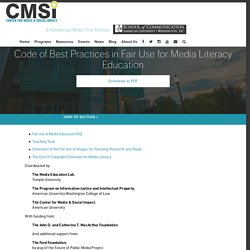
And additional support from: The Ford Foundation, by way of the Future of Public Media Project Introduction. Independent Schools Victoria. Independent Schools Victoria has negotiated licence agreements with agencies selected by the Australian Government to collect and distribute copyright fees.
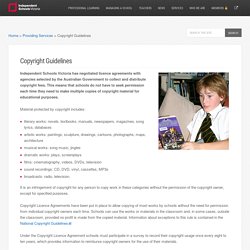
Dear teacher: copyright concerns you — copyright untangled. A Copyright-Friendly Toolkit. However fabulous Creative Commons and Public Domain content may be, sometimes you really need to use copyrighted material. Say you plan to comment on popular media or current events. For instance, you may be planning to critique the portrayal of Native Americans in commercial films. You are going to want to “quote” some commercial films like Pocahontas, Lone Ranger, and Dances with Wolves. If you are reviewing a book, you may want to share its cover art. You may use copyrighted content without asking permission if you believe that your use falls under the doctrine known as Fair Use. In general, when you transform original content, repurpose it, and add value to it in your own remix, you may be able to claim the use fair.
Smartcopying: the official guide to copyright issues for Australian schools and TAFE. Gaiman on Copyright Piracy and the Web. Copyright and Fair Use Animation Video.